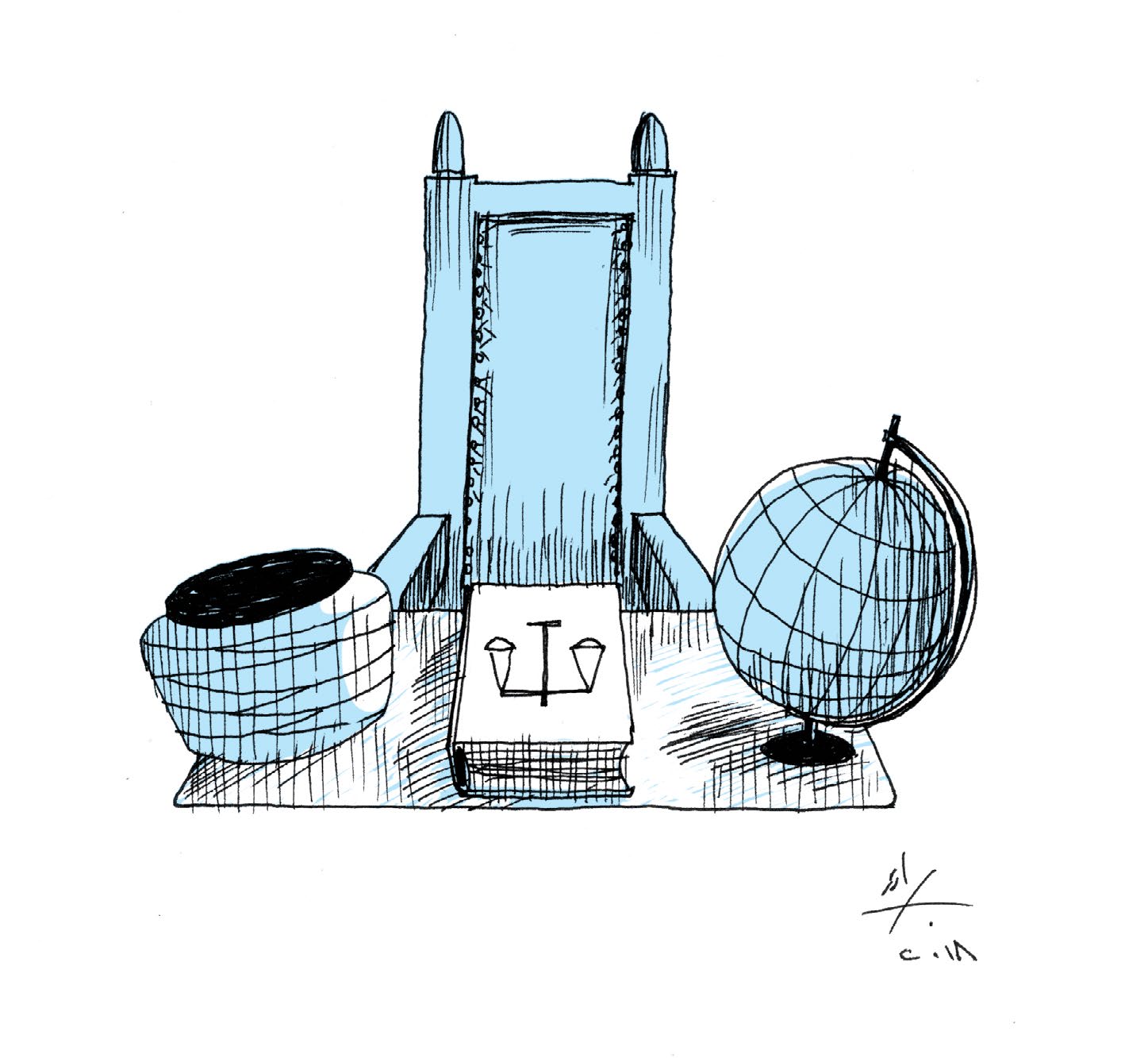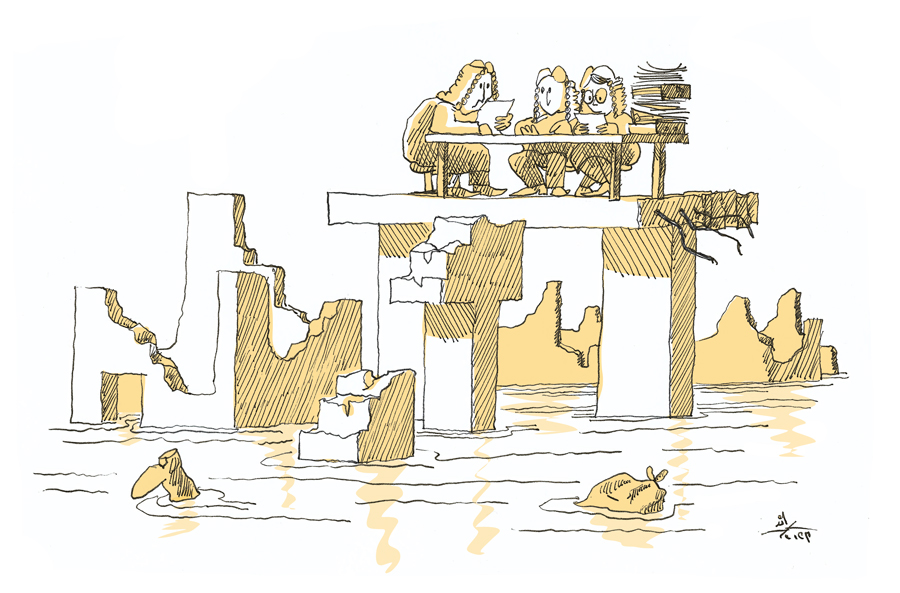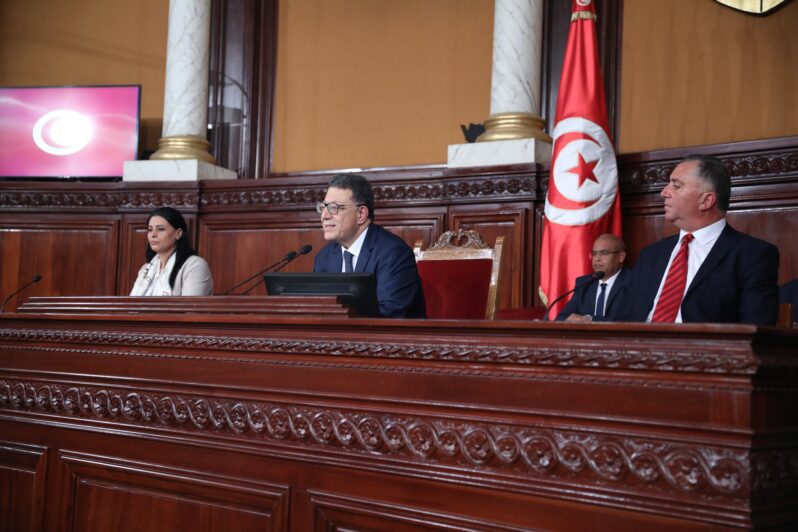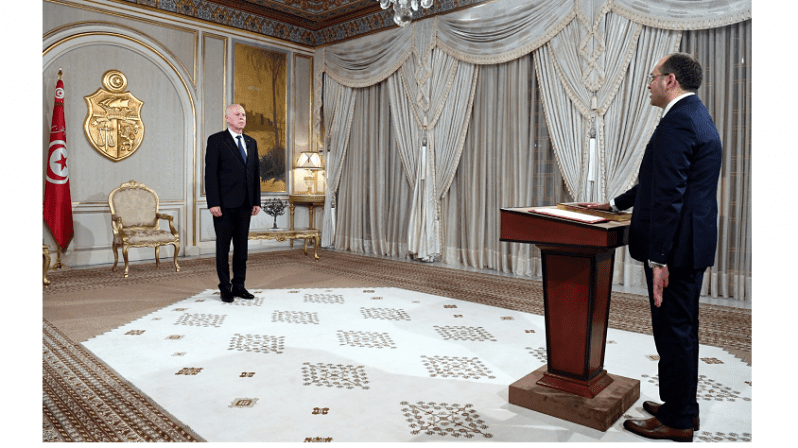Accommodating Contradictions in the Moroccan Constitution: Consensus and Rule by the “Commander of the Faithful”

Religion has a peculiar place in Morocco’s political system as the king is considered the state’s highest religious authority. In 1961, the term “commander of the faithful” [amir al-mu’minin] emerged, embodying the royal establishment’s strong presence in the religious sphere.
The Moroccan judiciary had previously enshrined this concept clearly in a decision stating that
Since Morocco is a state with a theocratic monarchical system, the king is considered a successor to God’s prophet, and it is not a religious state … Morocco is an Islamic state not only because it practices and adheres to the Islamic religion but also because it is united, in its identity, with Islam, which constitutes the reason for its existence. Consequently, in Morocco, given the total unity between political society and the thought underpinning it, any infringement on the Islamic religion is also a breach of Moroccan public order.[1]
The “Commandership of the Faithful” institution was enshrined in Article 19 of the four successive constitutions [preceding the 2011 Constitution] as a constitution within the Constitution, giving the king – a head of state with limited powers – other broad and “absolute” powers that he can exercise as commander of the faithful.[2]
The 2011 Constitution and Reopening the Question of Religion and State
During the drafting of the 2011 Constitution, the subject of religion’s relationship with the state was reopened for public debate. One current emerged advocating the enshrinement of a civil state and the subsequent recognition of international law’s precedence over domestic law, total respect for individual freedoms including freedom of belief and conscience, and restriction of the powers the king had exercised extra-constitutionally based on the Commandership of the Faithful institution. A second current emerged advocating, on the basis of particularism, the retention of the concept of Islamic law’s [i.e. Sharia’s] supremacy and the conditional precedence of international agreements.[3]
The Form of the State: A Battle Till the Eleventh-Hour
The disagreements over how the Constitution should address the issue of identity and its relationship with religion, on one hand, and fundamental rights and freedoms, on the other, persisted throughout the process of drafting the 2011 Constitution. They peaked when “initial leaks” appeared indicating that the committee drafting the Constitution had proposed stipulating a “civil state” and replacing the phrase “Morocco is an Islamic state” with a new phrase, namely “Morocco is a Muslim country”.
On June 7, 2011, a group of civil society organizations issued a document titled “The Argument for Giving Predominance to All Rights for All People in the New Constitution”. The document called for stipulating the state’s civil character as a key gateway for male and female citizens to exercise their rights and freedoms, thereby guaranteeing freedom of belief and religious practice; as an embodiment of the notion that the people are a source of power; as a framework for a modernist democratic society; and as a safeguard against the exploitation of provisions related to religion and conscience to shape public life.
In response to this initiative, Islamic parties and organizations condemned the retreat from the constitutional provisions on the Moroccan identity and the Islamic foundation of the state and society.[4] They cautioned against any “tendency toward secularizing the state and weakening its Islamic character”,[5] which they considered one of the “signs of an upheaval in identity and foundations [inqilab huwiyyatiyy wa-marja’iyy]”. The general secretary of the Justice and Development Party stated clearly that if Morocco’s identity and Islamic foundation are undermined, his party would vote against the Constitution.[6]
The 2011 Constitution and Accommodating Contradictions in the Framework of Consensus
After much debate, the two currents reached a consensus via a flexible and general phrasing of the new Constitution. The preamble reaffirmed the state’s Islamic character by declaring Morocco an Islamic state and stating that the Moroccan identity is distinguished by the preeminence of Islam therein. In the same context, the preamble stressed the Moroccan people’s commitment to the values of openness, moderation, tolerance, dialogue, and mutual understanding among all human cultures and civilizations. The Constitution also deemed “the Islamic religion”, “democratic choice”, and “the gains made in the area of fundamental freedoms and rights” to be fixed tenets immune from any constitutional revision.
Hence, the Constitution dealt with the question of the standing of Islamic law within the concept of identity and without making any reference to the supremacy of Islamic law among sources of legislation, even if personal laws are, as an exception, based on it.
Similarly, the provisions of Article 19 of the previous Constitution were reformulated into Articles 41 and 42 in an apparent separation of the king’s religious and political purviews. The Commandership of the Faithful took the first position and the headship of the state took the second.[7]
Islamic Law and Laws After the 2011 Constitution
The first legislative plan that the government prepared did not directly mention the position of Islamic law in the anticipated legislative reforms. The plan stressed that its foundation was primarily the Constitution, the royal speeches, and Morocco’s international obligations. Government discourse continued to insist on the state’s obligation to conform legislations in effect to the new Constitution and the ratified international agreements. However, during the law-making process, the question of competing foundations emerged in workshops for reforming several legislations primarily concerning the family, the Penal Code, and women’s rights. This demanded intervention by the royal establishment.
The Family Code: Partial Reform Pending Consensus
The Family Code issued in 2004 included an article allowing validation of customary marriages. The article was given temporary effect spanning ten years – the period that the legislators estimated was necessary to overcome the customs followed, particularly in rural areas, in this regard.
When the article’s original period ended, a big debate occurred in parliament. One side rejected the idea of a technical extension of the article on the basis that it is usually used to circumvent the provisions concerning underage marriage and restrictions on polygamy found in the code, while the other supported an extension because the compelling factors that could obstruct the notarization of marriage contracts still exist.
In response to this debate, the minister of justice stated that the article “is extremely sensitive, and as it was previously based on consensuses and royal arbitration, deleting the exception found therein requires building new consensuses”. He thereby hinted that reforming the Family Code is still considered a prerogative of the king to be exercised within the framework of the Commandership of the Faithful institution. Hence, the article’s effect was extended for five years.
A Mixed Royal Committee to Explore Abortion
Codifying safe abortion is one of the most controversial subjects. While the opposition and a number of rights organizations, particularly women’s organizations, stressed the need to address the topic from the perspective of Morocco’s international obligations, the majority parties insisted on rejecting decriminalization on the basis of religion and Islamic law.
On March 16, 2015, King Mohammed VI received the minister of justice and liberties, the minister of awqaf [religious endowment] and religious affairs, and the president of the National Human Rights Council to launch consultations on reviewing the laws regulating abortion in Morocco following the heated dispute over the subject. The overwhelming majority of proposals sought to retain the current legal provisions criminalizing abortion while adding three new exceptions permitting it, namely cases of rape, incest, and severe congenital defects or serious diseases that could afflict the fetus.
Recognizing Women’s Right to Be Public Notaries
On January 22, 2018, a Royal Cabinet statement declared that in a Council of Ministers meeting, King Mohammed VI had agreed on Moroccan women being public notaries. He had previously charged the minister of justice with studying the topic and consulted the Supreme Council for Religious Knowledge.
This royal initiative paves the way for a new precedent in the history of the notarial profession, which had, on a conservative religious basis, remained distinctly male despite the absence of any legal text barring women from it.[8]
The Participatory Banks Law: Banking and Fiduciary Institutions Under the Supervision of the Supreme Council for Religious Knowledge
Morocco’s financial and banking laws had been primarily positive law since the French and Spanish protectorate. The legislative reforms following the 2011 Constitution’s issuance “Islamized” part of this sector for the first time. This occurred via the issuance of the Participatory Banks Law after a difficult period of gestation.
To avoid striking any nerve, the legislators abstained from openly using the label “Islamic banks”. But the way that the law was drafted and debated, and its creation of new mechanisms unfamiliar to other banks and fiduciary institutions, gave unusual prominence to religious discourse.
Law no. 12/103 thus regulated participatory banks. They opened their branches after approval by the Supreme Council for Religious Knowledge’s Legal Committee [al-lajna al-shar’iyya] for Participative Finance, a committee independent of the government and Morocco’s central bank. The law was based on the principles and rules of Islamic jurisprudence. It prohibited interest [riba] while allowing the participatory banks to take deposits and conclude private contracts. It also obliged these banks to submit reports about their conformance with the aforementioned committee’s decisions at the end of each fiscal year so that their compliance with Islamic law could be ascertained.
The Draft Penal Code and the Question of its Foundation
In March 2015, the Ministry of Justice and Liberties unveiled a draft bill for a new Penal Code on its website and invited interested parties to discuss it before its presentation to parliament.
The draft introduced 500 amendments to the current Penal Code, including the deletion of 40 articles and the addition of 187. These amendments were intended to increase legal and judicial protection for individuals and conform the Penal Code to the Constitution, the international human rights agreements that Morocco ratified, and the Equity and Reconciliation Commission’s recommendations, without undermining the state’s Islamic character.[9]
The announcement of the draft Penal Code bill was a pivotal movement for reopening the question of competing foundations in the anticipated legislative reforms. The debate over issues concerning individual freedoms counterposed the legislation’s conservative provisions with the promises of the Constitution, which establishes the precedence of international conventions and agreements over domestic legislations and requires conforming these legislations to what ratification of these conventions requires. This applies to a set of fundamental rights including freedom of conscience, to the criminalization of consensual sexual relations, and to the tightening of penalties for eating in public during Ramadan.
A number of organizations considered the draft Penal Code a sign of an increasing backslide in government discourse on human rights in general and women’s rights in particular.[10]
The Universalism-Particularism Dichotomy in the Workshops on Ratifying International Agreements
During the debate of the bill to ratify the Optional Protocol to the Convention on the Elimination of All Forms of Discrimination against Women (CEDAW), a number of representatives mentioned the reservations to this agreement that Morocco had previously registered on the basis of “religious constants and constitutional guarantees that render ratification of international agreements contingent on them not conflicting with the Constitution”. In her response, the minister-delegate of foreign affairs and cooperation affirmed that Morocco is engaging progressively in CEDAW and dropping all reservations to it, retaining only interpretative statements concerning Moroccan legislation’s relationship with the prevailing “religious culture”.[11]
In general, the legal discourse after the approval of the 2011 Constitution has remained governed by the nature of the consensuses that produced the Constitution. The Universal Periodic Review of Morocco constituted a key moment for setting the ceiling of the anticipated change: while participating in the UN Human Rights Council’s session in Geneva, the minister of human rights declared that Morocco rejected 44 recommendations that the member states presented regarding abolishing discriminatory provisions on child custody and guardianship, marriage, inheritance, polygamy, and the criminalization of consensual sexual relations between the sexes. The rejection was based on “overarching constants stipulated by the Constitution”.
In this regard, the minister distinguished between issues that Moroccan society is still debating and that “concern the moral order” and issues that are “settled, as far as we in the government are concerned”.[12]
This article is an edited translation from Arabic.
Keywords: Islamic Law, Morocco, Constitutional reform, Islamic banks, Women’s rights
[1] Supreme Council (now the Court of Cassation) decision issued on February 10, 1960.
[2] ‘Izz al-Din al-‘Allam, al-Adab al-Sultaniyya: Dirasa fi Bunyat wa-Thawabit al-Khitab al-Siyasiyy, ‘Alam al-Ma’rifa series, no. 324, February 2006, p. 121.
[3] The Justice and Development Party deemed that “Moroccan society is authentic [asil] and aspires for a modern and free sovereign civil state”. It stressed that Morocco is a country that is proud of its Islamic foundation and that legislations should therefore not violate the precepts of Islam.
The Istiqlal Party called for the Constitution’s preamble to stipulate that the country’s laws must not conflict with Islam’s teachings and that Sharia is a main source of Morocco’s legislation.
[4] Mustafa al-Khalfi, editorial in Attajdid, is. 2660, June 13, 2011.
[5] Statement by the Movement for Reform and Renewal on June 12, 2011.
[6] Attajdid, is. 2260, June 13, 2011.
[7] Ruqayya al-Musaddaq, Matahat al-Sulta al-Ta’sisiyya: Hal Tata’ayash al-Malakiyya al-Dusturiyya ma’ Dustur Taqdiriyy, Matba’ al-Najah al-Jadida in Casablanca, first ed., 2016, p. 164.
[8] “Jadal bi-l-Maghrib Hawl Ta’nith Mihnat al-‘Udul, The Legal Agenda online, August 8, 2017.
[9] Speech by the minister of justice during the conference on the draft Penal Code that the Ministry of Justice held in Rabat on April 22, 2015.
[10] Petition by the Coalition for a Penal Code that Guarantees Freedom, Dignity, and Equality, June 11, 2015.
[11] Report by Parliament’s Justice and Legislation Committee, debate on the Bill to Ratify the Optional Protocol to the Convention on the Elimination of All Forms of Discrimination against Women, April 2015 session, p. 21.
[12] Speech by State Minister for Human Rights Mustafa Ramid during the examination of the national report for the third cycle of the Universal Periodic Review, Geneva, May 2, 2017.



